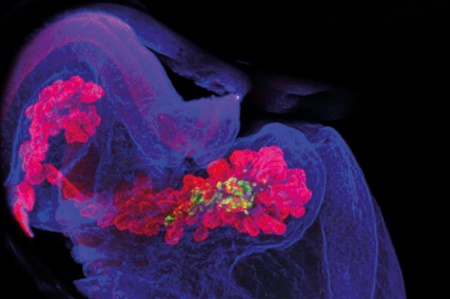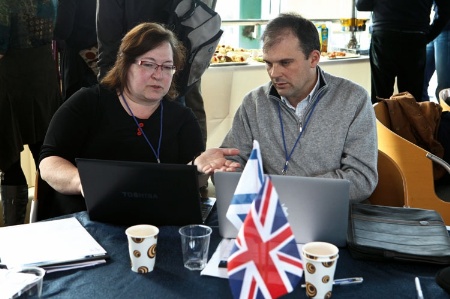Source: Mati Milstein
Pressing the case: Matthew Gould (right), the British ambassador to Israel, was a driving force behind BIRAX, according to Alan Gemmell, the director of the British Council in Israel
Just arrived from Cambridge and about to set off for a reception at the House of Lords, Yuval Dor is sitting in his London hotel on a grey November day with “a bag full of cellular mouse tissues” that his co-researchers had gathered for him.
“I’m going back to Israel with a bag of biological specimens to analyse. I hope I won’t be arrested: ‘Did you pack everything yourself?’ ‘No, I didn’t.’”
Dor, assistant professor in the department of developmental biology and cancer research at the Hebrew University of Jerusalem, is in London for UK-Israel Science Day.
He is part of an Israeli delegation including Yaakov Peri, minister of science and technology, in the country to celebrate the progress of the Britain-Israel Research and Academic Exchange Partnership (BIRAX) Regenerative Medicine Initiative.
On the schedule are lab visits, a presentation at a “Cosy Science” meeting, discussions with David Willetts, Peri’s UK counterpart – and even an opportunity for the Israeli minister to take part in a Hanukkah candle-lighting ceremony at No 10 with David Cameron.
But not everyone is in favour of these links: a small but vociferous band of British lecturers demand an academic boycott of Israel. That forms an interesting background against which to consider BIRAX.
So what is Dor’s role in all this? He is an expert on the regeneration of insulin-producing beta cells in the pancreas. This has great potential for the treatment of type 1 diabetes, but will work only if scientists can find a way to stop the immune system attacking the regenerating cells.
Although the two processes are “highly interactive”, notes Dor, they are often “dealt with in separation”.
One of the leading researchers on the immunity side is Anne Cooke, professor of immunobiology at the University of Cambridge.
“We had met at European Union conferences, been part of the same FP7 consortium and said it would be interesting to collaborate,” continues Dor, “but there was no platform to allow us to work together. Israel had bilateral links with countries such as Germany, Italy and Japan, which are less relevant [to his research], but not the UK.”
Although initial plans for BIRAX date back to 2008, the initiative was greatly scaled up in 2011.
As soon as the beefed-up programme was launched late that year, Dor and Cooke “decided to put in a joint proposal…It was a wonderful opportunity to leverage my interaction and to exchange materials, methods, mice and reagents,” he says.
From about 50 applications from joint Anglo-Israeli research teams, theirs was one of seven selected. Others address the fundamental challenges of using stem cells in treatment, nerve cell regeneration and new approaches to the treatment of multiple sclerosis and Parkinson’s disease.

“It’s not an artificial pairing just to get the money and run,” insists Dor. “What I do in the course of the project totally depends on input from Anne. And what she does depends on insights from my own research. Hopefully in two or three years’ time, we’ll get a major paper from both our labs saying something new about how the autoimmune process affects, and is affected by, beta cell regeneration.”
The impetus for BIRAX came largely from the British ambassador to Israel, Matthew Gould.
“He made much of the running,” explains Alan Gemmell, director of the British Council in Israel, “securing the majority of £4 million committed, but the next stage and the delivery of the current commitments sit within the British Council.
“We are trying to create a joined-up science and education programme in Israel, which runs from promoting the UK as a place to study to investing in early career researchers and the BIRAX programme, and hopefully institutional links that will lead to translational research with an economic prosperity objective for the UK.”
Hooking up
When BIRAX was scaled up in 2011, the decision was made to focus on regenerative medicine (both countries are leading players in the discipline); to create a high-profile UK-Israel Life Sciences Council to select the best joint projects; and to organise a major conference at Ben-Gurion University of the Negev that year.
Among the 250 experts attending the conference were 60 British scientists from 20 universities.
All this, in Gemmell’s words, meant that BIRAX put on the table “the credibility and cash” to facilitate “incredibly innovative ways to bring different capabilities and interests to focus on one problem”.
And so the matchmaking began. Dor and Cooke had long been keen to work together. Yaakov Nahmias, director of the Center for Bioengineering at the Hebrew University, actively sought a British research partner with compatible skills so that they could combine expertise in the understanding of blood vessels with tissue engineering in order to create a functioning liver from human stem cells.
The ideal collaborator turned out to be Holger Gerhardt, head of the Vascular Biology Laboratory at Cancer Research UK’s London Research Institute.
For others, however, it was the Negev conference itself that threw unexpected people together.
It was there, for example, that Kevin Shakesheff, professor of advanced drug delivery and tissue engineering at the University of Nottingham, met Sharona Even-Ram, principal investigator at the Hadassah Hebrew University Hospital.

“There was a really diverse range of people you don’t meet on the normal conference circuit,” he recalls. “She is a hardcore stem cell biologist looking at how the cells can be used to cure Parkinson’s. I’m on the materials science side, and know about how cells interact with materials. We had a tool they hadn’t considered, which will hopefully solve a problem in getting their cells into the body.”
Over and above this particular partnership, however, Shakesheff sees a broader synergy between British and Israeli researchers in the field.
“There’s been big UK investment in regenerative medicine through Catapult centres and regenerative medicine platform hubs,” he explains. “We’re getting really good translational research in the stem cell field, so that makes us useful when we are talking with fundamental stem cell biologists, because we provide a route whereby they can overcome some of the big problems in actually getting [such cells] into patients.”
For researchers used to international collaborations, Shakesheff continues, working with Israeli scientists poses no particular challenges, since they are required to work abroad before getting permanent domestic posts, with most spending time in postdoctoral study at major US universities.
This means “the culture when they set up their own labs is quite similar”, he says.
Boycott ‘not an issue’
What potentially could put a damper on BIRAX, of course, are calls for an academic boycott of Israel, although these have been far louder in the humanities than in the sciences.
“The boycott is not an issue in relation to this programme,” claims Gemmell, “which demonstrates that Britain and Israel want to work together. When you get the theme right, great scientists in both countries want to partner.”
Dor confirms that his own project has been “unaffected”, arguing that “boycotting Israeli academia is damaging the only sector in Israeli society that actively opposes the occupation and the settlement”.
Not only is his work “addressing a universal health issue”, he adds, but “my lab is full of Palestinians”.
He says: “I have a technician who comes every day from Ramallah, a graduate student from East Jerusalem, a surgeon now doing a PhD in my lab from the [occupied] territories. It’s the one place where you do see some normalcy between Israelis and Palestinians. Damaging that would be a pity.”
Register to continue
Why register?
- Registration is free and only takes a moment
- Once registered, you can read 3 articles a month
- Sign up for our newsletter
Subscribe
Or subscribe for unlimited access to:
- Unlimited access to news, views, insights & reviews
- Digital editions
- Digital access to THE’s university and college rankings analysis
Already registered or a current subscriber?





